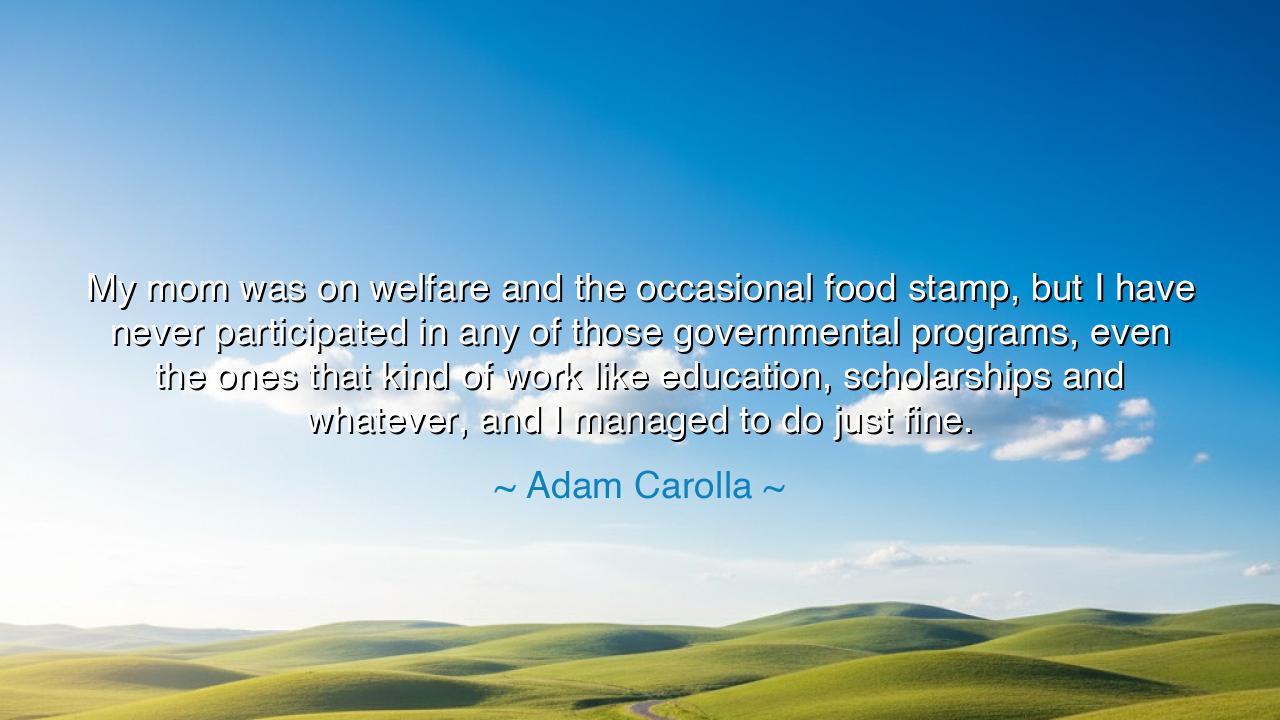
My mom was on welfare and the occasional food stamp, but I have
My mom was on welfare and the occasional food stamp, but I have never participated in any of those governmental programs, even the ones that kind of work like education, scholarships and whatever, and I managed to do just fine.






Host: The room was quiet, the soft glow from the lamp casting a warm light across the space. Outside, the world had settled into the stillness of night, the peaceful rhythm of the evening creating a sense of calm. Jeeny sat at the table, her fingers lightly tracing the rim of her cup, her expression thoughtful. Jack, standing near the window, gazed out into the darkened world, clearly reflecting on something deeper. There was a quiet understanding between them, as if a significant conversation was about to unfold.
Jeeny: (breaking the silence, her voice calm but curious) “I came across something by Adam Carolla today that really made me think. He said, ‘My mom was on welfare and the occasional food stamp, but I have never participated in any of those governmental programs, even the ones that kind of work like education, scholarships and whatever, and I managed to do just fine.’ What do you think about that?”
Jack: (pauses, his voice reflective) “It’s an interesting perspective, isn’t it? Carolla seems to be making a point about self-reliance and how he managed to succeed without depending on governmental programs, even though he came from a background that relied on them. There’s an implicit critique of the system in his words—he’s saying he didn’t need the help, even though it was available, which kind of challenges the idea that we should depend on these programs to succeed.”
Jeeny: (nodding slowly) “Exactly. It’s a reminder that while social safety nets exist to help people, there’s also this message of personal responsibility—the idea that if you put in the effort and make the right choices, you can succeed without needing assistance. It’s about being able to stand on your own feet, to rely on your own capabilities, even when the odds aren’t stacked in your favor.”
Host: The stillness in the room deepened, as their words settled into something more reflective. Jack turned slightly toward Jeeny, his expression softening as he considered the deeper meaning behind Carolla’s quote. Outside, the world had quieted, but inside, the conversation had taken on a more introspective tone, exploring the balance between individual effort and systemic support.
Jack: (his voice quieter now, more reflective) “What strikes me is the way Carolla frames his success. He’s not dismissing the fact that those programs exist, but he’s pointing out that he didn’t use them. It’s almost as if he’s saying that relying on government support can sometimes be seen as an excuse, and that self-determination can lead to success, too. But I wonder how much of that depends on circumstance—on privilege, on opportunities, and on the kind of support systems that are available to certain people.”
Jeeny: (softly) “Yes, and I think that’s where the complexity lies. While self-reliance is valuable, we can’t ignore the fact that not everyone has the same opportunities or access to resources. For some, those programs are essential for survival and progress. Carolla’s story is inspiring in its own right, but it doesn’t account for the fact that many people need help along the way, and those social programs can be life-changing.”
Jack: (nodding slowly) “Exactly. And I think that’s the key—the system should provide the right kind of support for those who need it, but it shouldn’t replace personal responsibility or initiative. The challenge is finding a balance between encouraging people to stand on their own and ensuring that those who need help can get it.”
Jeeny: (smiling gently) “Yes, it’s about empowerment. Social programs should empower people to make better choices, to have opportunities they might not have otherwise had. But at the same time, the individual has to take responsibility for their own path. It’s not about one or the other—it’s about finding ways to help people rise up, without giving them the impression that they can’t succeed without it.”
Host: The quiet in the room felt deeper now, as if the conversation had uncovered a deeper truth about self-reliance, social support, and the complexities of both. Outside, the world had quieted, but inside, the room was filled with a shared understanding about how individual effort and systemic support are not mutually exclusive—they can work together to create opportunities and build success.
Jack: (smiling softly, his voice more assured) “I think it’s a reminder that while we can take responsibility for our own actions, we also need to recognize that support—whether from the government or from society—can help provide the foundation for those who need it. It’s about empowering people to succeed on their own terms.”
Jeeny: (nodding warmly) “Exactly. Success is a combination of personal effort and the support systems that help us get there. They work in tandem, and when they do, they create opportunities for everyone to thrive.”
Host: The world outside had quieted to a peaceful stillness, but inside, the room was filled with understanding. Jeeny and Jack had uncovered a deeper truth in Carolla’s words—that while personal responsibility and self-reliance are important, the support provided by social systems can also play a crucial role in helping people succeed. It’s about finding a balance that encourages individual growth while providing the resources necessary for everyone to thrive. The night continued outside, but inside, the room was filled with the realization that true success comes from the combination of both personal effort and accessible support.






AAdministratorAdministrator
Welcome, honored guests. Please leave a comment, we will respond soon